Boyle J.A. The Cambridge History of Iran, Volume 5: The Saljuq and Mongol Periods
Подождите немного. Документ загружается.

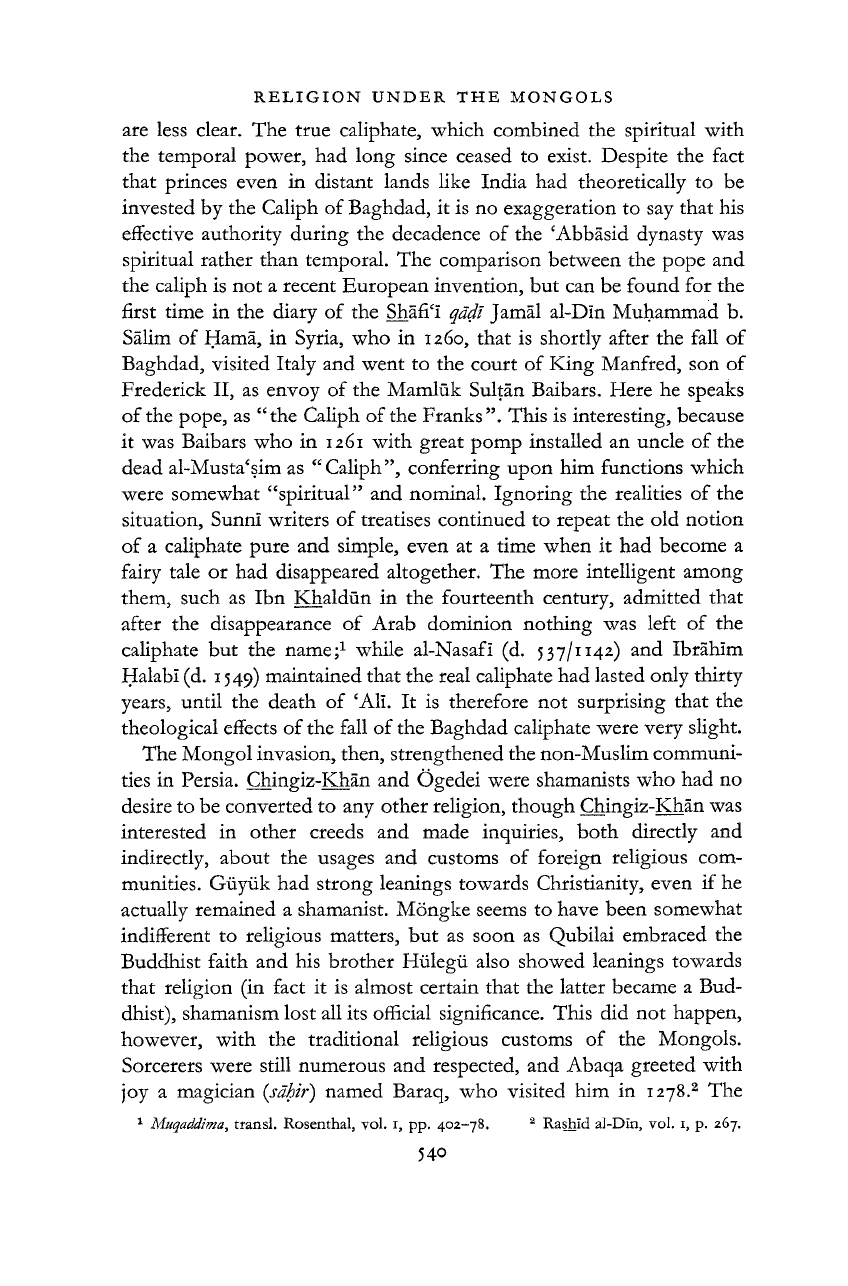
RELIGION UNDER THE MONGOLS
540
are less clear. The true caliphate, which combined the spiritual with
the temporal power, had long since ceased to exist. Despite the fact
that princes even in distant lands like India had theoretically to be
invested by the Caliph of Baghdad, it is no exaggeration to say that his
effective authority during the decadence of the 'Abbasid dynasty was
spiritual rather than temporal. The comparison between the pope and
the caliph is not a recent European invention, but can be found for the
first time in the diary of the Shafi'i qadi Jamal al-Din Muhammad b.
Salim of Hama, in Syria, who in 1260, that is shortly after the fall of
Baghdad, visited Italy and went to the court of King Manfred, son of
Frederick II, as envoy of the Mamluk Sultan Baibars. Here he speaks
of the pope, as "the Caliph of the Franks". This is interesting, because
it was Baibars who in 1261 with great pomp installed an uncle of the
dead al-Musta
c
sim as " Caliph", conferring upon him functions which
were somewhat "spiritual" and nominal. Ignoring the realities of the
situation, Sunni writers of treatises continued to repeat the old notion
of a caliphate pure and simple, even at a time when it had become a
fairy tale or had disappeared altogether. The more intelligent among
them, such as Ibn Khaldun in the fourteenth century, admitted that
after the disappearance of Arab dominion nothing was left of the
caliphate but the name;
1
while al-Nasafi (d. 537/1142) and Ibrahim
Halabi (d. 1549) maintained that the real caliphate had lasted only thirty
years,
until the death of 'AH. It is therefore not surprising that the
theological effects of the fall of the Baghdad caliphate were very slight.
The Mongol invasion, then, strengthened the non-Muslim communi-
ties in Persia. Chingiz-Khan and Ogedei were shamanists who had no
desire to be converted to any other religion, though Chingiz-Khan was
interested in other creeds and made inquiries, both directly and
indirectly, about the usages and customs of foreign religious com-
munities. Guyiik had strong leanings towards Christianity, even if he
actually remained a shamanist. Mongke seems to have been somewhat
indifferent to religious matters, but as soon as Qubilai embraced the
Buddhist faith and his brother Hiilegii also showed leanings towards
that religion (in fact it is almost certain that the latter became a Bud-
dhist),
shamanism lost all its official significance. This did not happen,
however, with the traditional religious customs of the Mongols.
Sorcerers were still numerous and respected, and Abaqa greeted with
joy a magician
(sdhir)
named Baraq, who visited him in 1278.
2
The
1
Muqaddima^
transl. Rosenthal, vol. 1, pp. 402-78.
2
Rashid al-Din, vol. 1, p. 267.
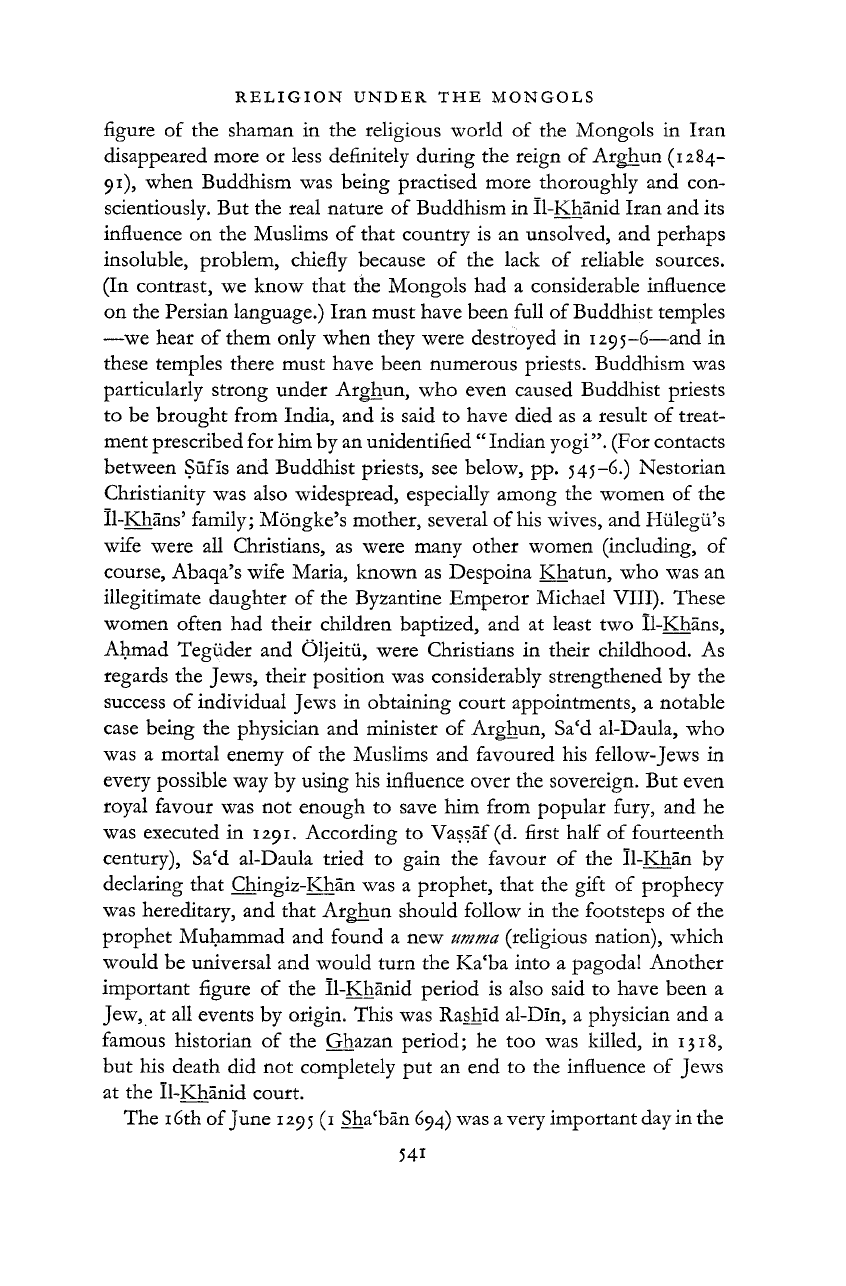
RELIGION UNDER THE MONGOLS
541
figure of the shaman in the religious world of the Mongols in Iran
disappeared more or less definitely during the reign of Arghun (1284-
91),
when Buddhism was being practised more thoroughly and con-
scientiously. But the real nature of Buddhism in Il-Khanid Iran and its
influence on the Muslims of that country is an unsolved, and perhaps
insoluble, problem, chiefly because of the lack of reliable sources.
(In contrast, we know that the Mongols had a considerable influence
on the Persian language.) Iran must have been full of Buddhist temples
—we hear of them only when they were destroyed in 1295-6—and in
these temples there must have been numerous priests. Buddhism was
particularly strong under Arghun, who even caused Buddhist priests
to be brought from India, and is said to have died as a result of treat-
ment prescribed for him by an unidentified "Indian yogi". (For contacts
between Sufis and Buddhist priests, see below, pp. 545-6.) Nestorian
Christianity was also widespread, especially among the women of the
Il-Khans' family; Mongke's mother, several of his wives, and Hulegii's
wife were all Christians, as were many other women (including, of
course, Abaqa's wife Maria, known as Despoina Khatun, who was an
illegitimate daughter of the Byzantine Emperor Michael VIII). These
women often had their children baptized, and at least two Il-Khans,
Ahmad Teguder and Oljeitii, were Christians in their childhood. As
regards the Jews, their position was considerably strengthened by the
success of individual Jews in obtaining court appointments, a notable
case being the physician and minister of Arghun, Sa
c
d al-Daula, who
was a mortal enemy of the Muslims and favoured his fellow-Jews in
every possible way by using his influence over the sovereign. But even
royal favour was not enough to save him from popular fury, and he
was executed in 1291. According to Vassaf (d. first half of fourteenth
century),
Sa'd al-Daula tried to gain the favour of the Il-Khan by
declaring that Chingiz-Khan was a prophet, that the gift of prophecy
was hereditary, and that Arghun should follow in the footsteps of the
prophet Muhammad and found a new
umma
(religious nation), which
would be universal and would turn the Ka'ba into a pagoda! Another
important figure of the Il-Khanid period is also said to have been a
Jew, at all events by origin. This was Rashid al-Din, a physician and a
famous historian of the Ghazan period; he too was killed, in 1318,
but his death did not completely put an end to the influence of Jews
at the Il-Khanid court.
The 16th of June 1295 (1 Sha'ban 694) was a very important day in the
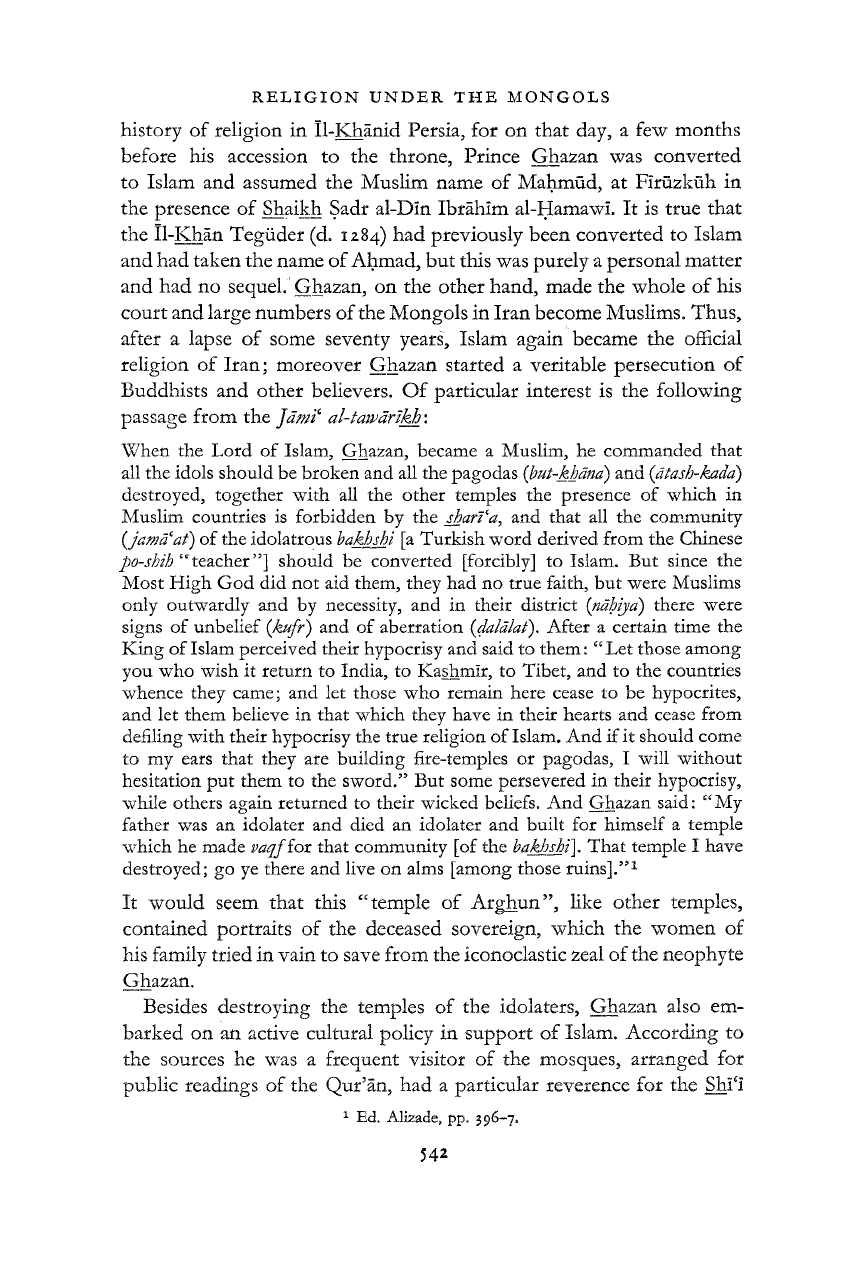
RELIGION UNDER
THE
MONGOLS
542
history of religion in Il-Khanid Persia, for on that day, a few months
before his accession to the throne, Prince Ghazan was converted
to Islam and assumed the Muslim name of Mahmud, at Firuzkuh in
the presence of Shaikh Sadr al-Din Ibrahim al-Hamawi. It is true that
the Il-Khan Tegiider (d. 1284) had previously been converted to Islam
and had taken the name of Ahmad, but this was purely a personal matter
and had no sequel. Ghazan, on the other hand, made the whole of his
court and large numbers of the Mongols in Iran become Muslims. Thus,
after a lapse of some seventy years, Islam again became the official
religion of Iran; moreover Ghazan started a veritable persecution of
Buddhists and other believers. Of particular interest is the following
passage from the Jdmi' al-tawdrikh:
When the Lord of Islam, Ghazan, became a Muslim, he commanded that
all the idols should be broken and all the pagodas
{but-khdnd)
and
{atash-kadd)
destroyed, together with all the other temples the presence of which in
Muslim countries is forbidden by the
sharl'a,
and that all the community
{jama
6
at)
of the idolatrous
bakhshi
[a Turkish word derived from the Chinese
po-shih
"teacher"] should be converted [forcibly] to Islam. But since the
Most High God did not aid them, they had no true faith, but were Muslims
only outwardly and by necessity, and in their district
(ndhiyd)
there were
signs of unbelief
(kufr)
and of aberration
(daldlat).
After a certain time the
King of Islam perceived their hypocrisy and said to them: "Let those among
you who wish it return to India, to Kashmir, to Tibet, and to the countries
whence they came; and let those who remain here cease to be hypocrites,
and let them believe in that which they have in their hearts and cease from
defiling with their hypocrisy the true religion of
Islam.
And if it should come
to my ears that they are building fire-temples or pagodas, I will without
hesitation put them to the sword." But some persevered in their hypocrisy,
while others again returned to their wicked beliefs. And Ghazan said: "My
father was an idolater and died an idolater and built for himself a temple
which he made
vaqjioT
that community [of the
bakhshi\
That temple I have
destroyed; go ye there and live on alms [among those ruins]."
1
It would seem that this "temple of Arghun", like other temples,
contained portraits of the deceased sovereign, which the women of
his family tried in vain to save from the iconoclastic zeal of the neophyte
Ghazan.
Besides destroying the temples of the idolaters, Ghazan also em-
barked on an active cultural policy in support of Islam. According to
the sources he was a frequent visitor of the mosques, arranged for
public readings of the Qur'an, had a particular reverence for the Shi'i
1
Ed.
Alizade,
pp.
396-7.
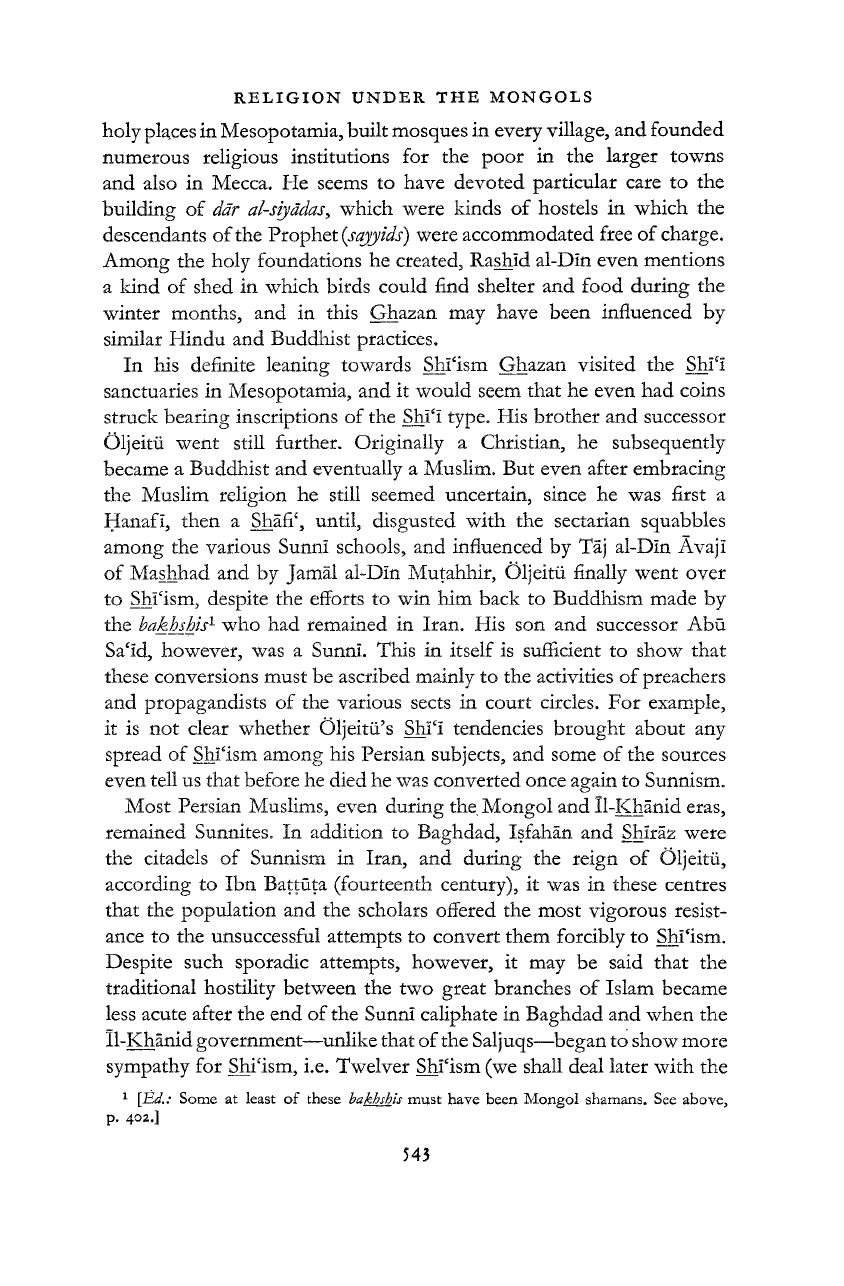
RELIGION UNDER THE MONGOLS
543
holy places in Mesopotamia, built mosques in every village, and founded
numerous religious institutions for the poor in the larger towns
and also in Mecca. He seems to have devoted particular care to the
building of ddr
a/siyddaSy
which were kinds of hostels in which the
descendants of the Prophet
(sayyids)
were accommodated free of charge.
Among the holy foundations he created, Rashid al-Dln even mentions
a kind of shed in which birds could find shelter and food during the
winter months, and in this Ghazan may have been influenced by
similar Hindu and Buddhist practices.
In his definite leaning towards Shfism Ghazan visited the Shf 1
sanctuaries in Mesopotamia, and it would seem that he even had coins
struck bearing inscriptions of the Shfi type. His brother and successor
Oljeitii went still further. Originally a Christian, he subsequently
became a Buddhist and eventually a Muslim. But even after embracing
the Muslim religion he still seemed uncertain, since he was first a
Hanafi, then a Shafi', until, disgusted with the sectarian squabbles
among the various Sunni schools, and influenced by Taj al-Dln Avajl
of Mashhad and by Jamal al-Din Mutahhir, Oljeitii finally went over
to Shfism, despite the efforts to win him back to Buddhism made by
the hakhshis
1
who had remained in Iran. His son and successor Abu.
Sa'Id, however, was a Sunni. This in itself is sufficient to show that
these conversions must be ascribed mainly to the activities of preachers
and propagandists of the various sects in court circles. For example,
it is not clear whether Oljeitii's Shfi tendencies brought about any
spread of Shfism among his Persian subjects, and some of the sources
even tell us that before he died he was converted once again to Sunnism.
Most Persian Muslims, even during the. Mongol and Il-Khanid eras,
remained Sunnites. In addition to Baghdad, Isfahan and Shiraz were
the citadels of Sunnism in Iran, and during the reign of Oljeitii,
according to Ibn Battuta (fourteenth century), it was in these centres
that the population and the scholars offered the most vigorous resist-
ance to the unsuccessful attempts to convert them forcibly to Shfism.
Despite such sporadic attempts, however, it may be said that the
traditional hostility between the two great branches of Islam became
less acute after the end of the Sunni caliphate in Baghdad and when the
Il-Khanid government—unlike that of the Saljuqs—began to show more
sympathy for Shfism, i.e. Twelver Shfism (we shall deal later with the
1
[Ed.: Some at least of these hakhshis must have been Mongol shamans. See above,
p.
402.]
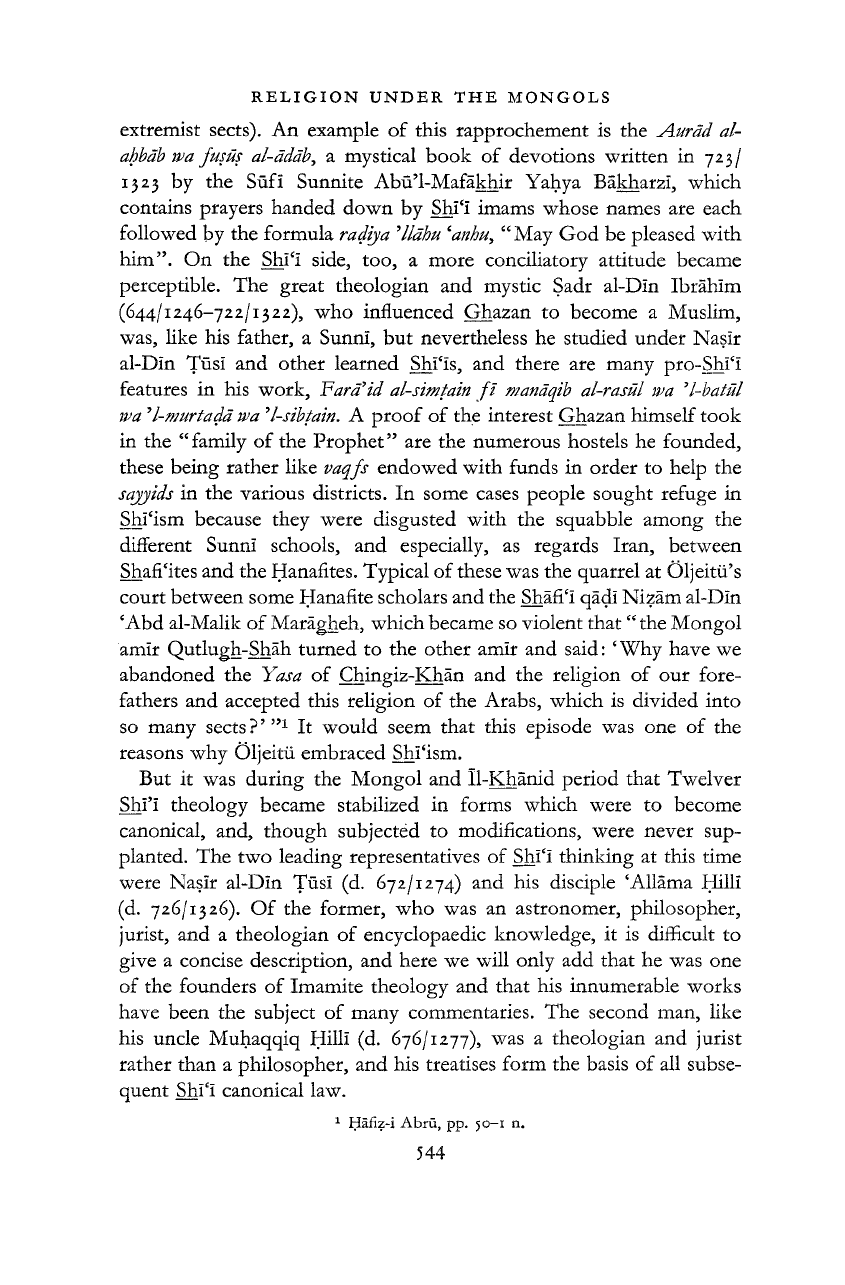
RELIGION UNDER
THE
MONGOLS
544
extremist sects).
An
example
of
this rapprochement
is the Aurâd al-
ahbdb wa fuşüş al-dddb
y
a
mystical book
of
devotions written
in 723/
1323
by the
Süfi Sunnite Abû'l-Mafâkhir Yahya Bâkharzi, which
contains prayers handed down
by
Shi'i imams whose names
are
each
followed
by the
formula
radiya Hldhu 'anhu, "May God be
pleased with
him".
On the Shi'!
side,
too, a
more conciliatory attitude became
perceptible.
The
great theologian
and
mystic Şadr al-Dln Ibrahim
(644/1246-722/1322),
who
influenced Ghazan
to
become
a
Muslim,
was,
like
his
father,
a
Sunni,
but
nevertheless
he
studied under Naşir
al-Din Tüsî
and
other learned Şhfis,
and
there
are
many pro-ShTi
features
in his
work,
Fara'id al-simtain ft mandqib al-rasül wa H-batül
wa H-murtadd wa H-sibtain. A
proof
of the
interest Ghazan himself took
in
the
"family
of the
Prophet"
are the
numerous hostels
he
founded,
these being rather like
vaqfs
endowed with funds
in
order
to
help
the
sayjids in the
various districts.
In
some cases people sought refuge
in
Shi'ism because they were disgusted with
the
squabble among
the
different Sunni schools,
and
especially,
as
regards Iran, between
ShafTites and the Hanafites. Typical
of
these was
the
quarrel
at
Öljeitü's
court between some Hanafite scholars and the Shâfi'i qâdî Nizâm al-Din
'Abd al-Malik
of
Mamgheh, which became
so
violent that "the Mongol
amir Qutlugh-Shah turned
to the
other amir
and
said:
'Why
have
we
abandoned
the Yasa of
Chingiz-Khân
and the
religion
of our
fore-
fathers
and
accepted this religion
of the
Arabs, which
is
divided into
so many sects
?' "
x
It
would seem that this episode
was one of the
reasons
why
Öljeitü embraced Shi'ism.
But
it was
during
the
Mongol
and
Il-Khânid period that Twelver
Şhi'i theology became stabilized
in
forms which were
to
become
canonical,
and,
though subjected
to
modifications, were never sup-
planted.
The two
leading representatives
of
Şhi'i thinking
at
this time
were Naşir al-Din Tusi
(d.
672/1274)
and his
disciple 'Allama Hilli
(d. 726/1326).
Of the
former,
who was an
astronomer, philosopher,
jurist,
and a
theologian
of
encyclopaedic knowledge,
it is
difficult
to
give
a
concise description,
and
here
we
will only
add
that
he was one
of
the
founders
of
Imamite theology
and
that
his
innumerable works
have been
the
subject
of
many commentaries.
The
second
man,
like
his uncle Muhaqqiq Hilli
(d.
676/1277),
was a
theologian
and
jurist
rather than
a
philosopher,
and his
treatises form
the
basis
of all
subse-
quent Şhi'i canonical
law.
1
Hâfîz-i Abra, pp.
50-1 n.
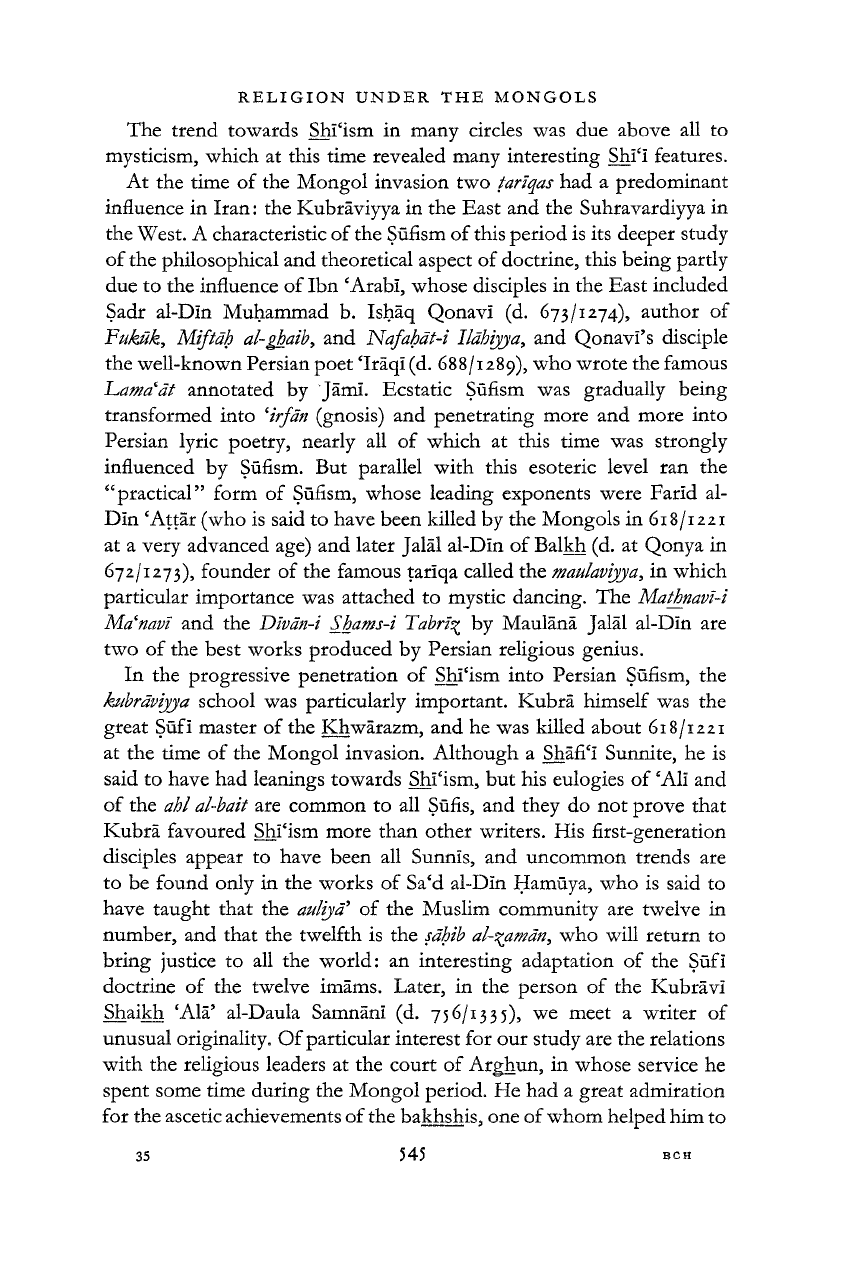
RELIGION UNDER
THE
MONGOLS
35 545
BCH
The trend towards Shi'ism
in
many circles
was due
above
all to
mysticism, which
at
this time revealed many interesting Shi'i features.
At
the
time
of the
Mongol invasion
two tariqas had a
predominant
influence
in
Iran:
the
Kubraviyya
in the
East
and the
Suhravardiyya
in
the West.
A
characteristic
of
the Sufism
of
this period
is its
deeper study
of the philosophical
and
theoretical aspect
of
doctrine, this being partly
due
to the
influence
of
Ibn "Arabi, whose disciples
in the
East included
Sadr al-Dln Muhammad
b.
Ishaq Qonavi
(d.
673/1274), author
of
Fukuk, Miftdh al-ghaib
y
and Nafahdt-i I/dhiyya, and
Qonavi's disciple
the well-known Persian poet "Iraqi (d. 688/1289),
who
wrote the famous
La/va'dt
annotated
by
Jami. Ecstatic Sufism
was
gradually being
transformed into
Hrfdn
(gnosis)
and
penetrating more
and
more into
Persian lyric poetry, nearly
all of
which
at
this time
was
strongly
influenced
by
Sufism.
But
parallel with this esoteric level
ran the
"practical" form
of
Sufism, whose leading exponents were Farid
al-
Din "Attar (who
is
said
to
have been killed
by the
Mongols
in
618/1221
at
a
very advanced age)
and
later Jalal al-Dln
of
Balkh (d.
at
Qonya
in
672/1273), founder
of the
famous tariqa called
the maulaviyjUy in
which
particular importance
was
attached
to
mystic dancing.
The
Mathnav։֊i
Mcfnavi and the Dwdn-i Shams-i
Tabri^
by
Maulana Jalal al-Din
are
two
of the
best works produced
by
Persian religious genius.
In
the
progressive penetration
of
Shi'ism into Persian Sufism,
the
kubraviyya
school
was
particularly important. Kubra himself
was the
great Sufi master
of
the Khwarazm,
and he was
killed about 618/1221
at
the
time
of the
Mongol invasion. Although
a
Shafi'i Sunnite,
he is
said
to
have
had
leanings towards Shi'ism,
but his
eulogies
of
"All
and
of
the ahl al-bait are
common
to all
Sufis,
and
they
do not
prove that
Kubra favoured Shi'ism more than other writers.
His
first-generation
disciples appear
to
have been
all
Sunnis,
and
uncommon trends
are
to
be
found only
in the
works
of
Sa
c
d al-Din Hamuya,
who is
said
to
have taught that
the
auliyd
9
of the
Muslim community
are
twelve
in
number,
and
that
the
twelfth
is the sahib al-^amdfiy who
will return
to
bring justice
to all the
world:
an
interesting adaptation
of the
Sufi
doctrine
of the
twelve imams. Later,
in the
person
of the
Kubravi
Shaikh
'Ala'
al-Daula Samnani
(d.
756/1335),
we
meet
a
writer
of
unusual originality.
Of
particular interest
for our
study
are the
relations
with
the
religious leaders
at the
court
of
Arghun,
in
whose service
he
spent some time during
the
Mongol period.
He had a
great admiration
for the ascetic achievements
of
the bakhshis, one
of
whom helped him
to
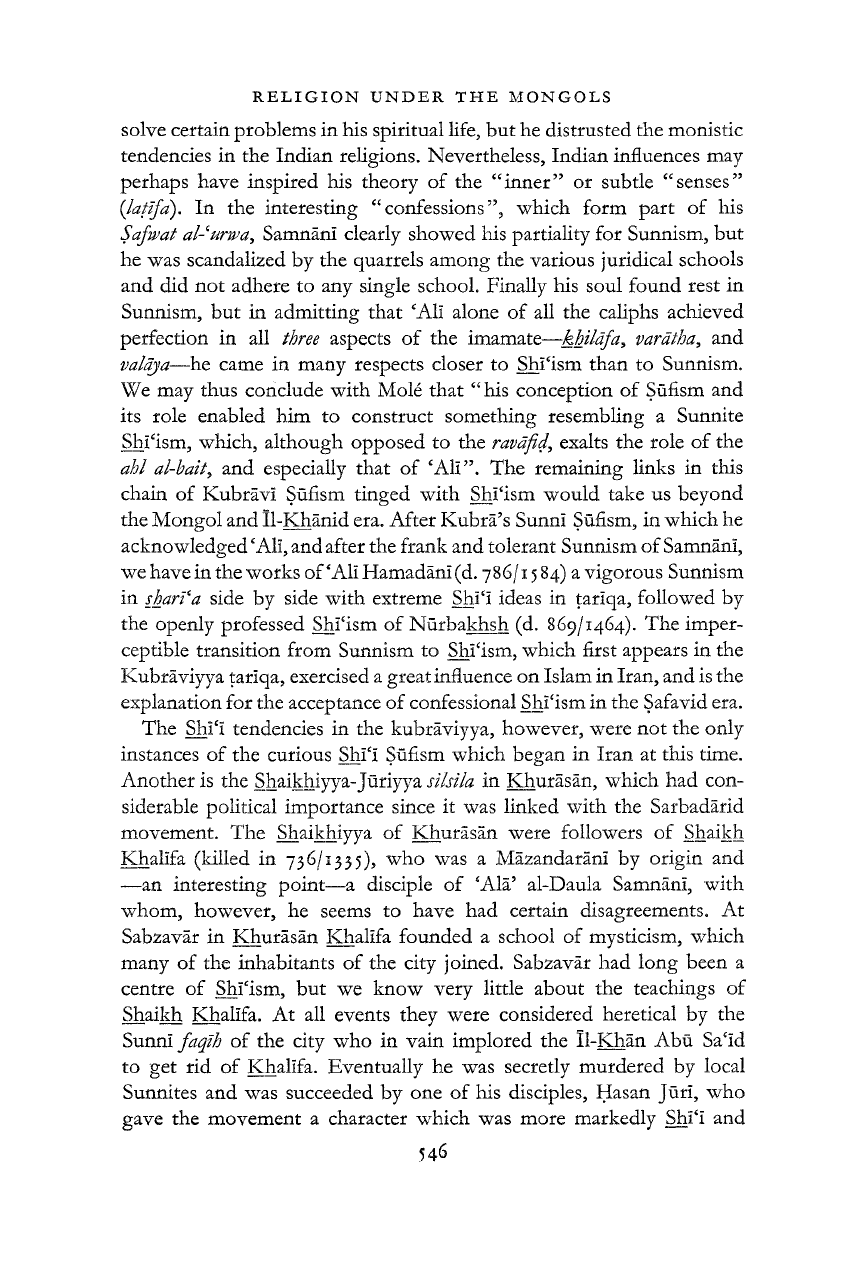
RELIGION UNDER THE MONGOLS
546
solve certain problems in his spiritual life, but he distrusted the monistic
tendencies in the Indian religions. Nevertheless, Indian influences may
perhaps have inspired his theory of the "inner" or subtle "senses"
(Jatifd).
In the interesting " confessions", which form part of his
Safwat
al-urwciy
Samnani clearly showed his partiality for Sunnism, but
he was scandalized by the quarrels among the various juridical schools
and did not adhere to any single school. Finally his soul found rest in
Sunnism, but in admitting that 'All alone of all the caliphs achieved
perfection in all
three
aspects of the
imamate—khildfa,
vardtha,
and
valdja—he
came in many respects closer to Shi'ism than to Sunnism.
We may thus conclude with Mole that "his conception of Süfism and
its role enabled him to construct something resembling a Sunnite
Shi'ism, which, although opposed to the
ravdfid,
exalts the role of the
ahl
al-bait,
and especially that of 'All". The remaining links in this
chain of Kubrávi Süfism tinged with Shi'ism would take us beyond
the Mongol and Il-Khanid era. After
Kubrá's Sunni Süfism, in which he
acknowledged'All, and after the frank and tolerant Sunnism of Samnani,
we have in the works of'All Hamadani
(d.
786/1584) a vigorous Sunnism
in
sharVa
side by side with extreme Shi'i ideas in tariqa, followed by
the openly professed Shi'ism of Nürbakhsh (d. 869/1464). The imper-
ceptible transition from Sunnism to Shi'ism, which first appears in the
Kubraviyya tariqa, exercised a great influence on Islam in Iran, and is the
explanation for the acceptance of confessional Shi'ism in the Safavid era.
The Shi'i tendencies in the kubraviyya, however, were not the only
instances of the curious Shi'i Süfism which began in Iran at this time.
Another is the
Shaikhiyya-Jüriyya sibila in Khurasan, which had con-
siderable political importance since it was linked with the Sarbadárid
movement. The Shaikhiyya of Khurasan were followers of Shaikh
Khalifa (killed in 736/1335), who was
a Mázandaráni by origin and
—an interesting point—a disciple of 'Alá' al-Daula Samnani, with
whom, however, he seems to have had certain disagreements. At
Sabzavár in Khurasan Khalifa founded a school of mysticism, which
many of the inhabitants of the city joined.
Sabzavár had long been a
centre of Shi'ism, but we know very little about the teachings of
Shaikh Khalifa. At all events they were considered heretical by the
Sunni
faqih
of the city who in vain implored the Il-Khan Abü Sa'id
to get rid of Khalifa. Eventually he was secretly murdered by local
Sunnites and was succeeded by one of his disciples, Hasan
Jürí, who
gave the movement a character which was more markedly Shi'i and
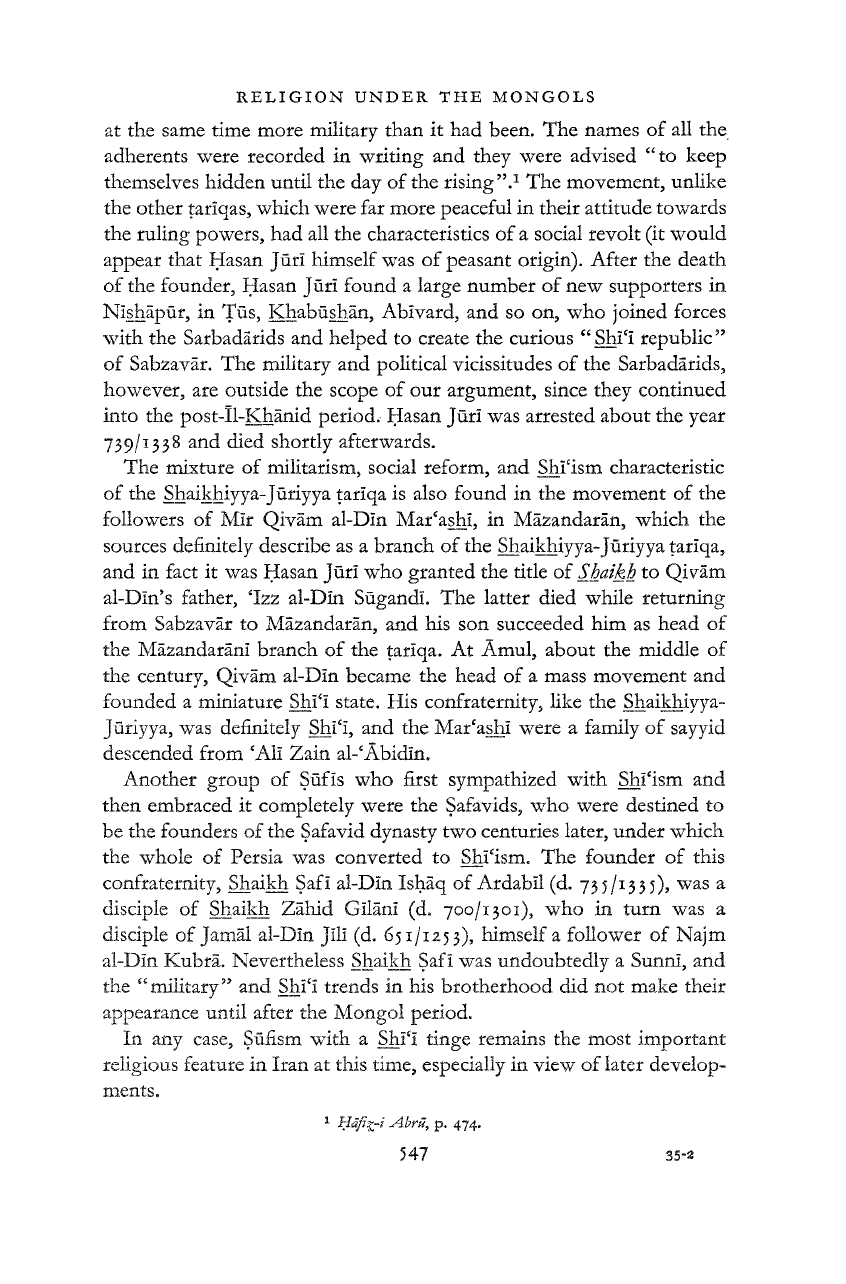
RELIGION UNDER THE MONGOLS
at the same time more military than it had been. The names of all the
adherents were recorded in writing and they were advised "to keep
themselves hidden until the day of the rising".
1
The movement, unlike
the other tariqas, which were far more peaceful in their attitude towards
the ruling powers, had all the characteristics of a social revolt (it would
appear that Hasan Juri himself was of peasant origin). After the death
of the founder, Hasan Juri found a large number of new supporters in
Nishapur, in Tus, Khabushan, Abivard, and so on, who joined forces
with the Sarbadarids and helped to create the curious " Shi'i republic"
of Sabzavar. The military and political vicissitudes of the Sarbadarids,
however, are outside the scope of our argument, since they continued
into the post-ll-Khanid period. Hasan Juri was arrested about the year
739/1338 and died shortly afterwards.
The mixture of militarism, social reform, and Shi'ism characteristic
of the Shaikhiyya-Juriyya tariqa is also found in the movement of the
followers of Mir Qivam al-Din Mar'ashi, in Mazandaran, which the
sources definitely describe as a branch of the Shaikhiyya-Juriyya tariqa,
and in fact it was Hasan Juri who granted the title of
Shaikh
to Qivam
al-Din's father, 'Izz al-Din Sugandi. The latter died while returning
from Sabzavar to Mazandaran, and his son succeeded him as head of
the Mazandarani branch of the tariqa. At Amul, about the middle of
the century, Qivam al-Din became the head of a mass movement and
founded a miniature Shi'i state. His confraternity, like the Shaikhiyya-
Juriyya, was definitely Shi'i, and the Mar'ashi were a family of sayyid
descended from 'All Zain al-'Abidin.
Another group of Sufis who first sympathized with Shi'ism and
then embraced it completely were the Safavids, who were destined to
be the founders of the Safavid dynasty two centuries later, under which
the whole of Persia was converted to Shi'ism. The founder of this
confraternity, Shaikh Safi al-Din Ishaq of Ardabil (d. 735/1335), was a
disciple of Shaikh Zahid Gilani (d. 700/1301), who in turn was a
disciple of Jamal al-Din Jili (d. 651/1253), himself a follower of Najm
al-Din Kubra. Nevertheless Shaikh Safi was undoubtedly a Sunni, and
the "military" and Shi'i trends in his brotherhood did not make their
appearance until after the Mongol period.
In any case, Sufism with a Shi'i tinge remains the most important
religious feature in Iran at this time, especially in view of later develop-
ments.
1
Hafi^-i Abru
y
p. 474.
547
35-2
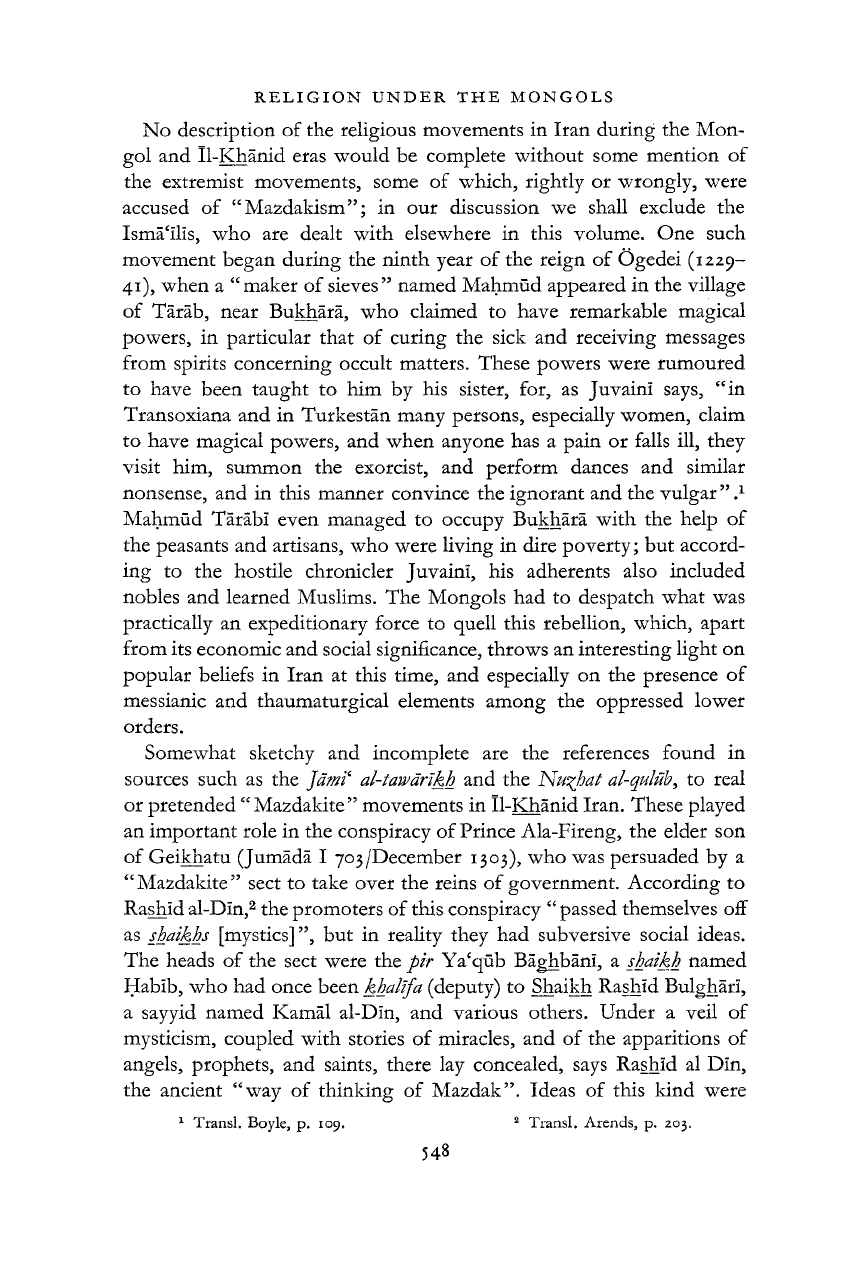
RELIGION UNDER
THE
MONGOLS
548
No description
of
the religious movements
in
Iran during
the
Mon-
gol
and
Il-Khanid eras would
be
complete without some mention
of
the extremist movements, some
of
which, rightly
or
wrongly, were
accused
of
"Mazdakism";
in our
discussion
we
shall exclude
the
Isma'ilis,
who are
dealt with elsewhere
in
this volume.
One
such
movement began during
the
ninth year
of the
reign
of
Ogedei (1229-
41),
when
a "
maker
of
sieves
"
named Mahmud appeared
in the
village
of Tarab, near Bukhara,
who
claimed
to
have remarkable magical
powers,
in
particular that
of
curing
the
sick
and
receiving messages
from spirits concerning occult matters. These powers were rumoured
to have been taught
to him by his
sister,
for, as
Juvaini says,
"in
Transoxiana
and in
Turkestan many persons, especially women, claim
to have magical powers,
and
when anyone
has a
pain
or
falls
ill,
they
visit
him,
summon
the
exorcist,
and
perform dances
and
similar
nonsense,
and in
this manner convince
the
ignorant and
the
vulgar
" ,
x
Mahmud Tarabi even managed
to
occupy Bukhara with
the
help
of
the peasants
and
artisans,
who
were living
in
dire poverty;
but
accord-
ing
to the
hostile chronicler Juvaini,
his
adherents also included
nobles
and
learned Muslims.
The
Mongols
had to
despatch what
was
practically
an
expeditionary force
to
quell this rebellion, which, apart
from its economic and social significance, throws an interesting light
on
popular beliefs
in
Iran
at
this time,
and
especially
on the
presence
of
messianic
and
thaumaturgical elements among
the
oppressed lower
orders.
Somewhat sketchy
and
incomplete
are the
references found
in
sources such
as the Jam? al~tawdrikh and the Nu^hat al-qulub, to
real
or pretended "Mazdakite" movements
in
Il-Khanid Iran. These played
an important role
in the
conspiracy
of
Prince Ala-Fireng,
the
elder
son
of Geikhatu (Jumada
I
703/December 1303),
who
was persuaded
by a
"Mazdakite" sect
to
take over
the
reins
of
government. According
to
Rashid al-Din,
2
the promoters
of
this conspiracy "passed themselves
off
as
shaikhs
[mystics]but
in
reality they
had
subversive social ideas.
The heads
of the
sect were the
pir
Ya'qub Baghbani,
a shaikh
named
Habib,
who had
once been
khalifa
(deputy)
to
Shaikh Rashid Bulghari,
a sayyid named Kamal al-Din,
and
various others. Under
a
veil
of
mysticism, coupled with stories
of
miracles,
and of the
apparitions
of
angels, prophets,
and
saints, there
lay
concealed, says Rashid
al Din,
the ancient
"
way
of
thinking
of
Mazdak". Ideas
of
this kind were
1
Transl. Boyle,
p. 109.
2
Transl. Arends,
p. 203.
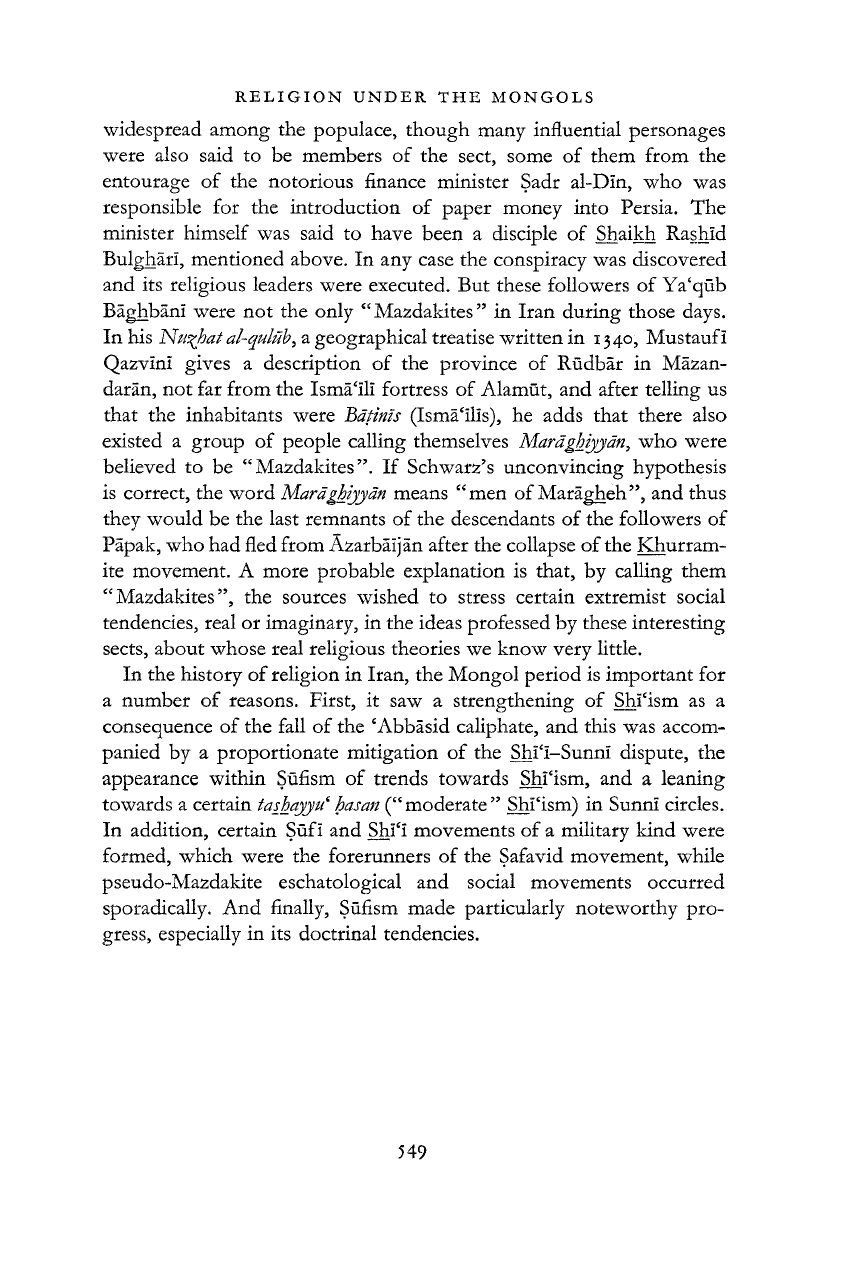
RELIGION UNDER
THE
MONGOLS
549
widespread among
the
populace, though many influential personages
were also said
to be
members
of the
sect, some
of
them from
the
entourage
of the
notorious finance minister Sadr al-Din,
who was
responsible
for the
introduction
of
paper money into Persia.
The
minister himself
was
said
to
have been
a
disciple
of
Shaikh Rashid
Bulghäri, mentioned above.
In any
case
the
conspiracy
was
discovered
and
its
religious leaders were executed.
But
these followers
of
Ya'qub
Bäghbäni were
not the
only
"
Mazdakites"
in
Iran during those days.
In his
Nu^hat
al֊qulub>
a
geographical treatise written
in
1340, Mustaufi
Qazvini gives
a
description
of the
province
of
Rödbär
in
Mäzan-
darän,
not far
from
the
Isma'ili fortress
of
Alamut,
and
after telling
us
that
the
inhabitants were
Bätims
(Isma'ilis),
he
adds that there also
existed
a
group
of
people calling themselves
Maräghiyyän, who
were
believed
to be
"Mazdakites".
If
Schwarz's unconvincing hypothesis
is correct,
the
word
Maräghiyyän
means
"men of
Marägheh",
and
thus
they would
be the
last remnants
of
the descendants
of
the followers
of
Päpak, who had fled from Äzarbäijän after
the
collapse
of
the Khurram-
ite movement.
A
more probable explanation
is
that,
by
calling them
"Mazdakites",
the
sources wished
to
stress certain extremist social
tendencies, real
or
imaginary,
in the
ideas professed
by
these interesting
sects,
about whose real religious theories
we
know very little.
In
the
history
of
religion
in
Iran,
the
Mongol period
is
important
for
a number
of
reasons. First,
it saw a
strengthening
of
Shfism
as a
consequence
of
the fall
of
the 'Abbasid caliphate,
and
this
was
accom-
panied
by a
proportionate mitigation
of the
Shf i-Sunni dispute,
the
appearance within Sufism
of
trends towards Shfism,
and a
leaning
towards
a
certain
tashayyu' hasan
("moderate" Shfism)
in
Sunni circles.
In addition, certain Sufi
and
Shfi movements
of a
military kind were
formed, which were
the
forerunners
of the
Safavid movement, while
pseudo-Mazdakite eschatological
and
social movements occurred
sporadically.
And
finally, Sufism made particularly noteworthy pro-
gress,
especially
in its
doctrinal tendencies.
